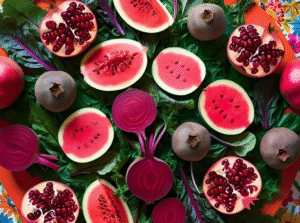
Boost Nitric Oxide Naturally
Nitric oxide (NO) is a vital molecule in the body, playing a key role in cardiovascular health, exercise performance, and overall wellness. This powerful compound helps relax blood vessels, improve blood flow, and support various physiological processes. Fortunately, you can boost nitric oxide naturally through diet by incorporating foods that boost nitric oxide production. In this blog post, we’ll explore the best foods to elevate nitric oxide levels and the remarkable benefits of doing so, helping you optimize your health with natural, nutrient-rich choices.
Why Boost Nitric Oxide?
Nitric oxide acts as a vasodilator, meaning it widens blood vessels to enhance circulation. This process supports heart health, lowers blood pressure, and improves oxygen delivery to muscles and organs. Boosting nitric oxide naturally can also enhance exercise endurance, support brain function, and even improve sexual health by promoting healthy blood flow. Additionally, nitric oxide has antioxidant properties, protecting cells from damage and supporting immune function. By focusing on nitric oxide-boosting foods, you can harness these benefits without relying on supplements.
Top Foods That Boost Nitric Oxide
Certain foods are packed with nutrients like nitrates, L-arginine, and antioxidants that stimulate nitric oxide production. Here are the best foods to increase nitric oxide levels:
- Beets: Beets are a nitric oxide powerhouse, rich in dietary nitrates that the body converts into NO. Studies show that beetroot juice can lower blood pressure and improve exercise stamina. Add beets to salads, smoothies, or roast them for a nutrient-dense side dish.
- Leafy Greens: Spinach, arugula, kale, and Swiss chard are loaded with nitrates and antioxidants. These greens not only boost nitric oxide naturally but also protect NO molecules from breaking down. Enjoy them raw in salads or lightly steamed to preserve their nitrate content.
- Citrus Fruits: Oranges, lemons, and grapefruits are high in vitamin C, which enhances nitric oxide synthase activity and protects NO from oxidative damage. Snack on citrus fruits or add them to water for a refreshing, nitric oxide-supporting boost.
- Pomegranate: Pomegranate juice is rich in polyphenols, which stimulate nitric oxide production and improve endothelial function. Its antioxidant properties make it a heart-healthy choice for increasing nitric oxide levels. Sip on pure pomegranate juice or sprinkle seeds on yogurt.
- Watermelon: This juicy fruit contains L-citrulline, an amino acid that converts to L-arginine, a precursor to nitric oxide. Watermelon can improve blood flow and muscle recovery, making it a great pre-workout snack.
- Nuts and Seeds: Walnuts, almonds, and sunflower seeds are excellent sources of L-arginine. These healthy fats also support cardiovascular health, complementing their nitric oxide-boosting effects. Toss them into smoothies or eat them as a snack.
- Garlic: Garlic activates enzymes that increase nitric oxide production, promoting vasodilation. Incorporate fresh garlic into your cooking for both flavor and health benefits.
- Dark Chocolate: High-quality dark chocolate (70% cocoa or higher) contains flavonoids that enhance NO production and improve blood flow. Enjoy a small piece as a heart-healthy treat.
- Red Wine (in moderation): Red wine’s polyphenols support nitric oxide synthesis, but moderation is key to avoid counteracting its benefits.
Benefits of Boosting Nitric Oxide
Incorporating foods that boost nitric oxide into your diet offers a range of health benefits:
- Improved Cardiovascular Health: Nitric oxide relaxes blood vessels, reducing blood pressure and lowering the risk of heart disease. Enhanced circulation also supports overall heart function.
- Enhanced Exercise Performance: By improving blood flow and oxygen delivery to muscles, nitric oxide can boost endurance and reduce fatigue during workouts.
- Better Cognitive Function: Increased blood flow to the brain supports memory, focus, and overall cognitive health, potentially reducing the risk of age-related decline.
- Support for Sexual Health: Nitric oxide improves blood flow, which can enhance erectile function and sexual performance in both men and women.
- Stronger Immune System: Nitric oxide’s antimicrobial properties help the body fight infections, bolstering immune defenses.
Tips to Maximize Nitric Oxide Production
To increase nitric oxide levels naturally, combine these foods with a healthy lifestyle. Regular exercise, especially aerobic activities, stimulates NO production. Avoid excessive mouthwash use, as it can kill nitrate-reducing bacteria in the mouth that aid nitric oxide synthesis. Also, prioritize cooking methods like steaming or eating raw to preserve nitrates in vegetables.
Conclusion
Boosting nitric oxide naturally through diet is a simple yet powerful way to enhance your health. By incorporating foods that boost nitric oxide like beets, leafy greens, citrus fruits, and dark chocolate, you can support heart health, improve exercise performance, and promote overall vitality. Pair these foods with a balanced lifestyle to maximize their nitric oxide-boosting benefits. Start adding these nutrient-rich foods to your meals today and experience the transformative effects of increasing nitric oxide levels naturally!
Affiliate Disclaimer
Some of the links in this blog post may be affiliate links, which means I may earn a small commission if you click on the link and make a purchase, at no additional cost to you. I only recommend products or services that I believe in and think will provide value to my readers. Your support through these links helps keep this blog running and allows me to continue providing helpful content. Thank you for your trust and support!